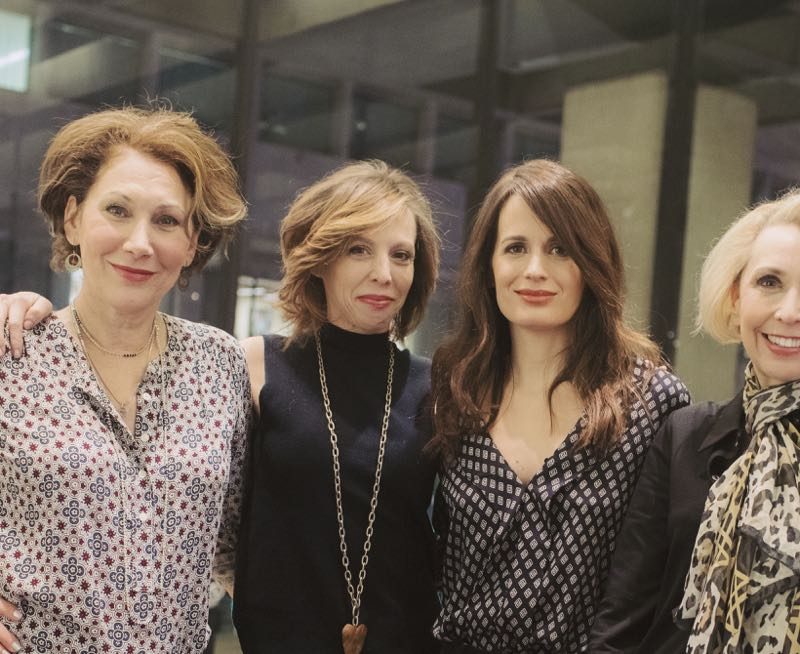The Women of The Babylon Line: Maddie Corman, Randy Graff, Julie Halston, and Elizabeth Reaser
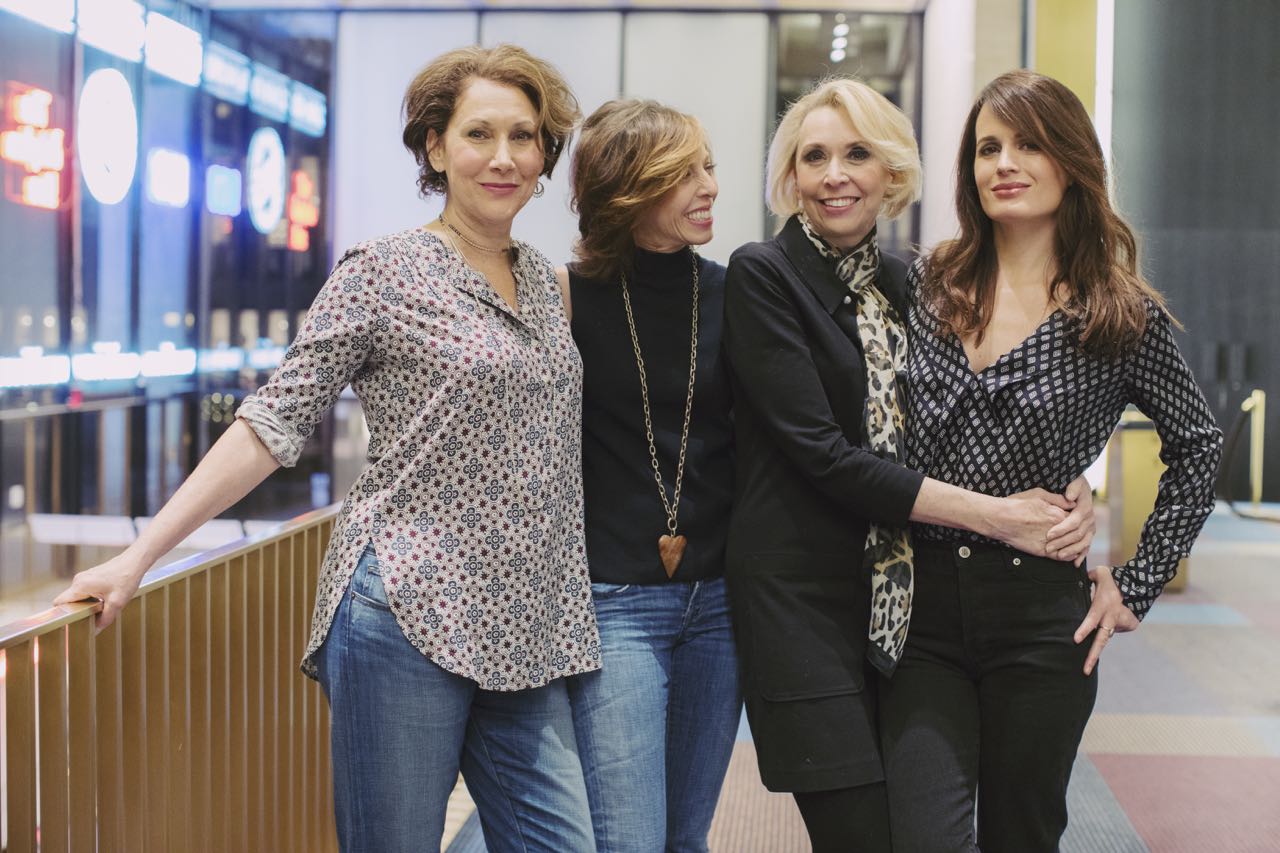
Written by Victoria Myers
Photography by Jacqueline Harriet
December 21st, 2016
In Richard Greenberg’s The Babylon Line, now playing at Lincoln Center Theater, four women—some friends, some not—come together for a weekly creative writing class in 1967 Long Island. The play gives the all too rare chance for four actresses to be on stage together in fully formed roles. The actresses of The Babylon Line—Maddie Corman, Randy Graff, Julie Halston, and Elizabeth Reaser—are a formidable group with experiences that range from broad comedies to naturalistic dramas, and all of whom have made substantial contributions to the theatre. We gathered them to discuss their rehearsal process, working together, roles for women, and more. This conversation has been edited and condensed.
When you start rehearsal, do you like to come into it with a lot prepared? Do you like to find it in the room? Some of each?
Elizabeth: They had all done this play before. I was the only person who hadn’t done a full production. They were all ready to go and could’ve opened that night. I’m serious.
Maddie: No. But it was the most prepared I’ve ever been, just because we had already done it. It was kind of a treat to get to come back into a rehearsal room after having done it.
Randy: But it was a whole new play when you [Elizabeth] came.
Elizabeth: I had to work on an accent for a month before I got here, because I knew I was going to get there and they were all going to be perfection, and I didn’t want to be the loser that shows up with a faulty accent.
Julie: I’m from Long Island, and I kind of am Midge Braverman. There’s no process for me. I do not prepare, I do not do anything organically. I’m not joking here. I find my performance with an audience. That’s what I do. I hate rehearsing. I do not like the process. I don’t like process. I like an audience, and me.
Do any of you like a long rehearsal period?
Randy: I do. I’m the opposite of Julie. I love the process, the creative process, and working with other actors. I’m fine without having an audience.
Elizabeth: It also depends on the thing. With this play, we did a lot of weeks [of rehearsal] and I needed it. If it is some dumb thing you’re doing, then you don’t want to rehearse. But this play can hold some rehearsal. It’s dense.
Maddie: I agree. We were saying earlier how we love talking, and when we get ready, even now, in our dressing room that we all share, I think that is part of the preparation for this particular show—the conversation, the deepening of friendship. Randy and Julie and I had the luxury of actually knowing each other for two years in between Poughkeepsie [at New York Stage and Film] and actually doing the show. I hope that translates. I think it does. Our day may be however it may be—often not great—and then we come into the basement. I feel like in this world and [as the characters in] Levittown, we all kind of escape our lives and come into the classroom. It’s kind of nice to have that.
Randy: Pretend to be somebody else for a couple of hours.
Maddie: And to come into another world. It’s not even that we have to pretend, it’s that we get to be our best selves for a few hours of the day.
Randy: Also it’s interesting that it takes place in a different time period. That’s also alluring. It’s fun. We get to really transform. Which is always interesting and fun.
Maddie: Even though Julie denies it, we did have a very nice rehearsal process where our director really let us play and explore.
Julie: Just to qualify why I hate rehearsing, so often I do comedies, and comedy is found when you have an audience. That’s why I can justify sounding like a cretin. But when you’re doing comedic material, it’s a lot about rhythm. It’s a lot about the music of the words. You really find that when you do it and when you’re in front of people. It would be very different if I was doing Martha in Who’s Afraid of Virginia Woolf. I would probably want to rehearse for a few days. Probably.
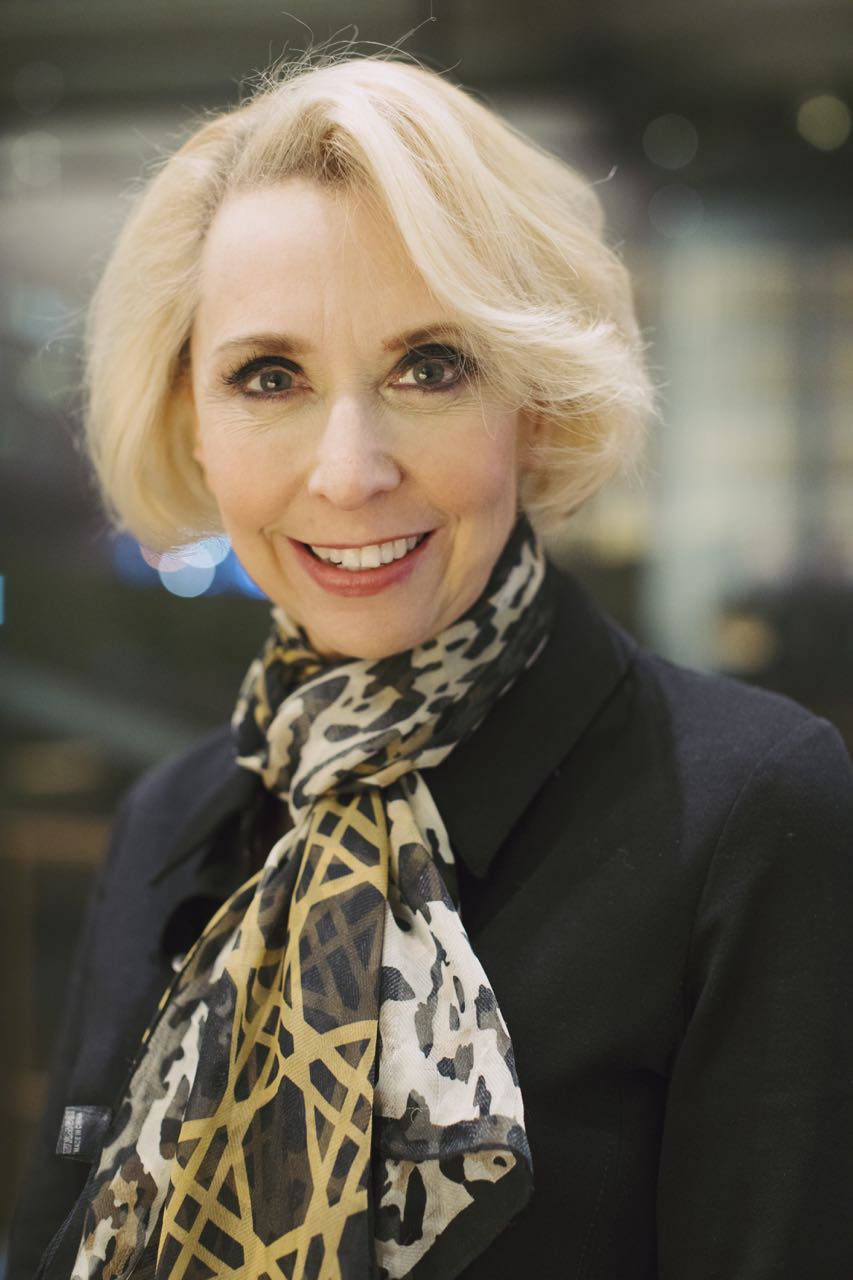
The play mostly takes place in the late 1960s,. Was that something that you leaned into, or did you think about that less and let the costumes and the set and the language do the work for you in terms of the period aspect? Did you do research?
Randy: I can just say for me, it’s very personal. This character that I play, Frieda Cohen, is based on my mother and two of my mothers’ friends who lived in Brooklyn and moved to Long Island. When I read the play, these three women just popped out at me. It was very personal. The costumes and the hair, they helped, but it was just extra. But I tend to work from the inside out. But this one was very familiar very quickly when I read it, just like for Julie, because of the world. But those three women in particular—my mom and two of her friends—just came off the page when I read it.
Elizabeth: That’s the fun in it. You get to do all this research. Terry [Kinney, director] and his associate, Ilana [Becker], would send us these videos about Levittown and about the period. I had done something else in this period in recent years, so I had already done a lot research on the time. It’s part of the fun of it. Also, for me, a big part of it was reading all these books that my character talks about.
Maddie: I did find that the costumes, even the undergarments, help, because there is a certain posture and certain things that come with that. At first in rehearsal, we were all very comfortable with each other, and there is a formality that comes with wearing heels and wearing certain things with tight waists. That helped me go a step beyond, I think. But it was nice that they weren’t there right away. I think Terry would probably say, and Rich too, that more than the period, it’s about the relationships and keeping them honest and not trying to comment on the period, but become the people that we are. That was, to me, the most interesting thing about our process. We had the material there if we wanted it, but it wasn’t about, “Oh wait, you’re doing that wrong.” It was about being honest with characters. As somebody who lived in the suburbs for a long time, there are a lot of things going on in these people’s lives, certainly the lives of the women in this play, that are still going on emotionally for women today.
Elizabeth: That’s funny because someone said to me, “It was a hard time for women back then. Women needed men at that point to get by,” and I just felt like, it doesn’t seem that different.
Maddie: We’ve been rehearsing and performing this play during the election and the aftermath. I think we’ve been particularly aware.
Julie: But one thing about Midge Braverman’s look, a lot of people have commented to me about how much I look like a young Anne Meara. Her own children, who have come to the show, have said how moving it was to see that look. They really felt like they were seeing their mom again. I knew their mom pretty well. For me, I do channel Anne Meara. I’m proud to, because I loved her and she was great, and she was a great New Yorker. That’s been very nice.
Maddie: Sarah Holden [costume designer] was great about working with us. I think I can speak for each of us that we had a very strong take on our characters. She was very good at including us in the design process.
Elizabeth: See, I’m always the opposite. I have a take on the character but I never know what the hell they’re wearing. I’m not a clothes person. But she helped me learn about the character through the clothes.
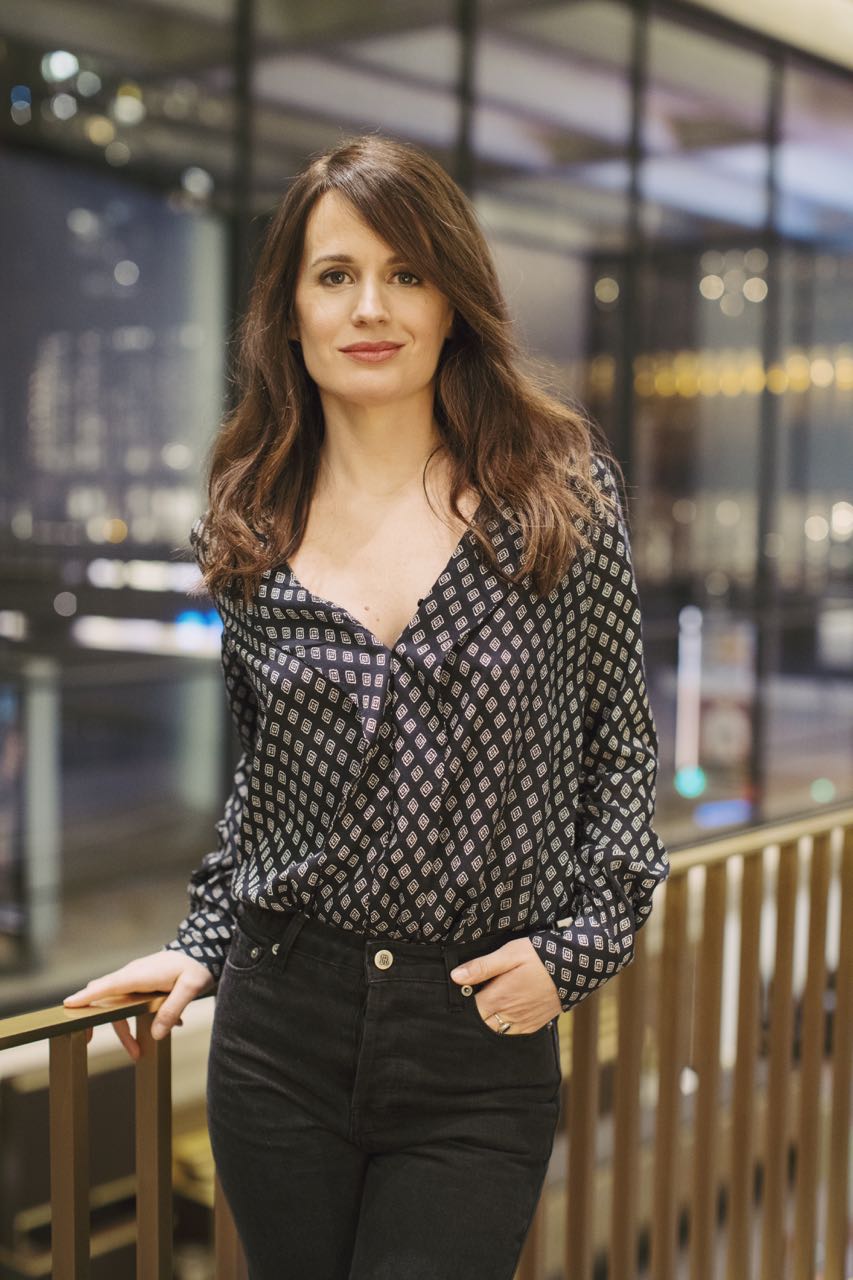
Do you all tend to look for characters who you can immediately relate to or do you go towards things that totally scare you?
Randy: I go for both. I like to look at things that scare me because it challenges me and pushes me as an actress. This one was just a gift, a total gift.
Maddie: Richard Greenberg loves women. I also feel like Anna is a gift. I didn’t necessarily see that the first time I read through the play, I just saw Richard Greenberg and said okay. But he really loves women and he writes full women. He writes women with stories. For me, it’s not like, “Oh, I am this character,” or, “I’m not this character,” but that a character is complex, especially for women.
Randy: I would say for Long Island Jewish women, it’s very easy to go cartoon, but you can’t with this play because of what he’s written underneath them. He doesn’t condescend to them. He loves them, he celebrates them in this play.
Elizabeth: With Joan I was like, this is the hardest thing that I could ever do. And I also felt I know this person, so I have to try to do it. But to be able to talk this way is a whole other thing because it’s really quite a lot of language.
Julie: We’re pretty in awe of Reaser. We’re pretty in awe of her. We really are. We were already the unit. But we all fell in love with her immediately, and she just brought so much. It just took the play to a whole other level.
Elizabeth: People don’t understand about how strong you have to be as a female, as an actress, and what it takes to still be around and be doing it, how hard it is and what you’ve been through, and no one knows. I already knew who these women all were before I got here, and I thought, “This is going to be just so scary.” Not that I thought they weren’t going to be nice, but I just was like, “I don’t want to show up and try to do this shit in front of them.” But I just had to deal with, every day, that fresh humiliation of failure, and they were all so wonderful. They’re all incredibly brilliant. This is a rare thing.
Randy: There’s no competition here. We share a dressing room together and it’s just total love and support.
Maddie: I think, not to keep going back to the gift of the play, but I think it helps a cast when everybody’s got such a great thing to work on. I mean I look around every night and just go, “Oh!” It’s so much fun to listen to everybody onstage and off. It’s really a cast of characters. We admire each other.
Elizabeth: We’re like a little family.
You’ve all touched on this, but it’s unusual to have four women in a play together, especially where each has a character with a full backstory and who’s not just there to serve one of the other characters.
Julie: Yeah, or a man.
Elizabeth: [Or to just say] “Whatever do you mean?” Absolutely. You’re not going to get to see a play with these badass women all together in one play. Usually it’s like one badass. But this many incredible actresses is rare.
Maddie: Over a certain age, as well.
Julie: We’re women with real stories.
Elizabeth: There’s this cliché idea about women—”Oh, get a bunch of women together…[and there’s trouble].” It just annoys me because it couldn’t be further from the truth, at least of my experience as an actress. I wish there were more women around. Usually there’s one or two, tops.
Julie: Right, and then six guys.
Maddie: We have a great cast, and our stage management crew is all female. Terry’s associate, Ilana. We have a lot of women around us. But it is true that usually it would be one of us playing all of these parts.
Randy: I think the audiences are actually appreciating that, that they’re seeing this.
Elizabeth: Because a lot of the audiences are women and they’re getting to see themselves. They’re the best audiences too, by the way.
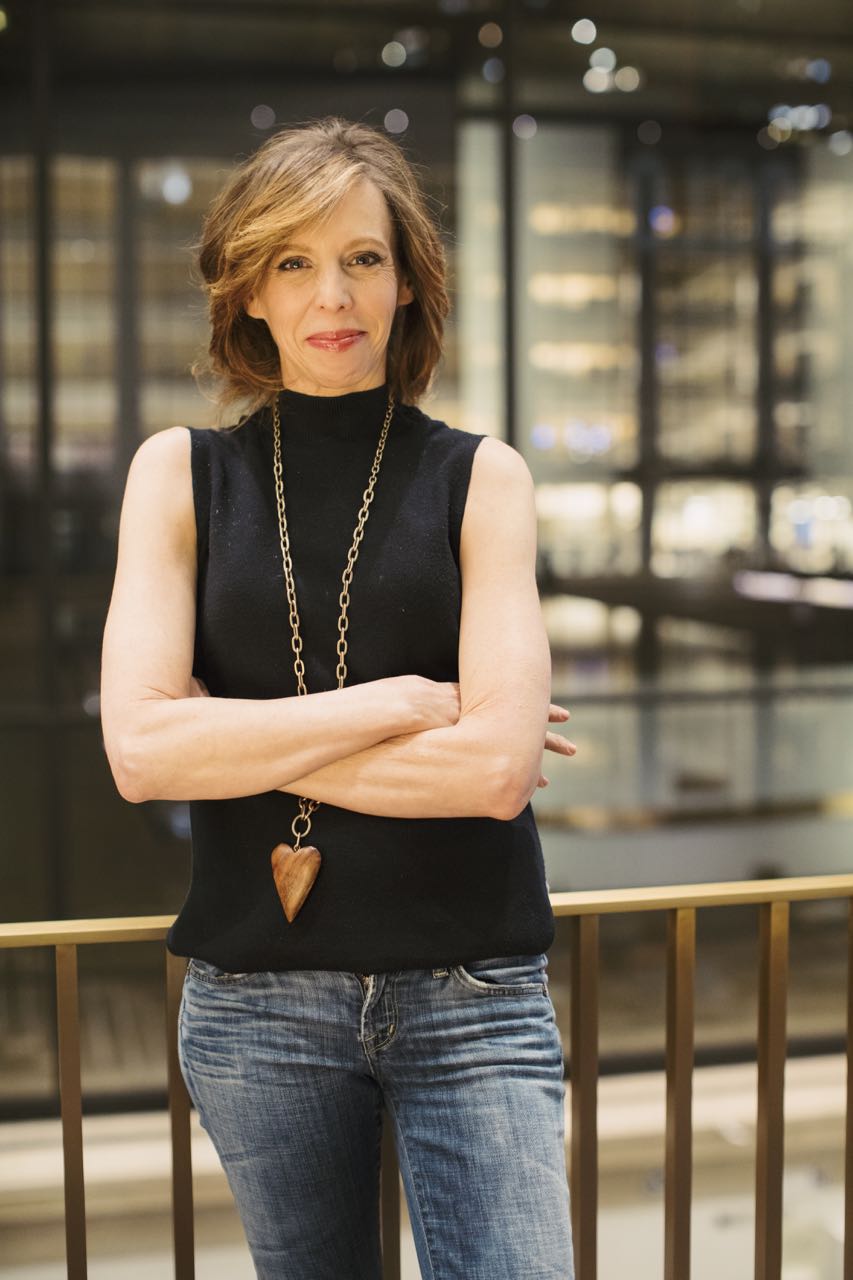
The play has the device of the women telling the stories they’ve written. Do you find that that impacts how you play the subtext in the scenes?
Julie: Again, Richard has written it in. Even though we’ve gone through this process where they start off really not knowing what to write and their really awkward attempts and him not wanting to teach, by the time those stories, the real true stories, come out, as Josh’s [Radnor] character says, the students suddenly erupt in prose. It really is right on the page. It’s so joyous.
Elizabeth: The whole play just lifts off. It just goes to a whole other level.
Maddie: But when I read it, I was like, how are we going to do this?
Randy: It’s a tough play to read because it’s written in prose. I read it three times and I could never picture it. I just knew it was great, but I couldn’t picture it. I couldn’t wait to see what Terry’s vision of it was. Usually you get a script and there are stage directions, but with this there are just long passages. It looks like Shakespeare.
Elizabeth: It’s almost no stage directions.
Julie: Yeah, there’s very few stage directions. There are certainly no indications of adjectives.
Elizabeth: Because the writing is so good it directs itself.
Maddie: He’s a confident writer too. He’ll say, “Here, you guys figure out how to do it. I did the writing. Now I turn it over to you. This is your job now. I did my job.”
Did your performances change a lot once you started previews?
Julie: I really am sincere about this because I’ve done a lot of Broadway musicals in the X amount of years and it’s not always about listening. But with this play, I actually find myself listening.
Maddie: We change it too. This play is a living, breathing thing. It changes nightly and it should.
Randy: We have a director who encourages us to play.
Elizabeth: Yeah, and to keep searching. Not to be corny, but he says it is the search. You’re not done. You’re just never done.
Randy: Because the material’s so rich, why would it ever be done? He’s got a lot there. Many of my friends have said they walk away feeling very haunted. It’s in their minds.
Maddie: We have to hear the stories, not just tell the stories, but listen to the stories. It helps to have a group of actors that really do find new things nightly. It’s fun to listen as well as to actually tell the stories.
With the election and everything going on in the world, especially those things that pertain to women, do you find that it affects the tone of the show?
Maddie: Yes. I mean I found that audiences, and myself, are hungry for art, hungry for intelligent art, and happy to be transported someplace else.
Elizabeth: Those first few shows after the election, it was like you could feel it in the room. We were all shattered.
Randy: We’re still grappling. But they do want to be transported to another… What’s the line that you have [Elizabeth]?
Elizabeth: “I’m fond of novels that transport you to places where you’re glad you’re not.”
Maddie: But it was hard for us. We were like, “How are we going to do this?” But then it was like thank God. I’d probably be curled in a fetal position on the floor if I weren’t doing this show.
Randy: The day after the election, the one line in the play referencing the developer—“the man who was a developer, that’s not a person you respect”—it got applause and stopped the show.
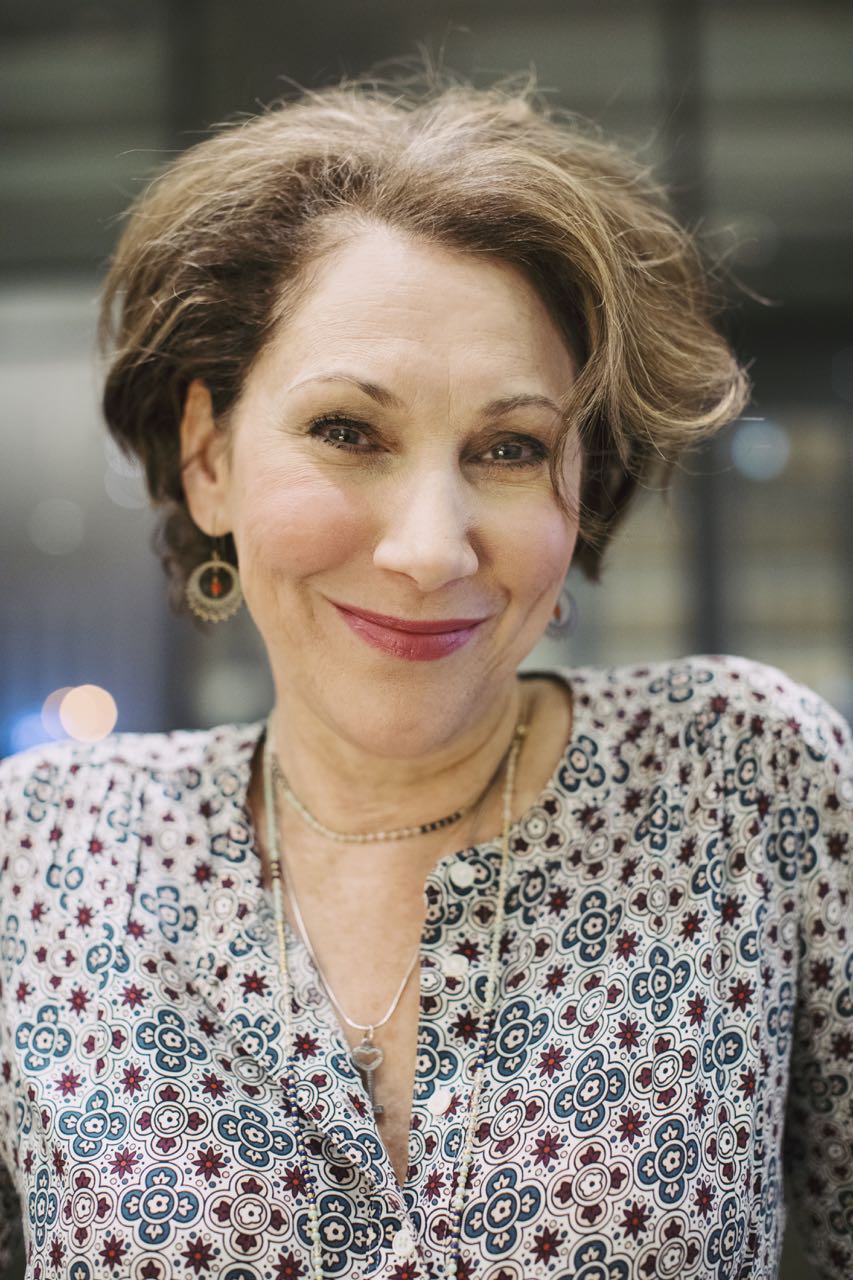
Let’s talk more about parts for women in theatre.
Maddie: They’re better [than other places].
Julie: Yeah. But we also need women writers. We need more women writers and directors. We need to be pushing them and giving them the goods.
Maddie: I would also dare to say that we have women writers, and we need artistic directors and boards to produce those writers. I think it’s happening.
Julie: It’s starting to.
Maddie: Maybe there will be more of a mandate now to say, “You know what? We need to focus on ourselves. We need to speak up for ourselves. We need to make sure we’re heard.” But I agree, the more female writers and directors we have, the more we’re going to see those stories. I’ve been really lucky, I’ve got to play a lot of great roles in the theatre. It’s my happy place to be. If we could afford to only do theatre, but I think that’s another issue. Women are great. We all want more of it. But it’s rare to get to be in a play with this many great women.
Elizabeth: Never happens.
Julie: And with great roles. It’s not the modern medium. Let’s face it. TV is the modern medium and the Internet, it’s the modern medium. Theatre is almost like, “Wait, are you still doing opera? What’s happening?” It’s an 18th century convention. But I think what we also see is that there’s still relevance in going to a theatre, sitting with other people, seeing live performances. As long as the material is really great and worthy, it will keep going. It’s been going on since homo sapiens started communicating with each other. I think we just have to keep really pressing and pushing for the women’s stories.
Maddie: Support each other. Support women who are theatre artists. Stop necessarily looking for other artists to come into the theatre. We’re all here, trained and happy to be working. I think that we just need to keep supporting each other. Hopefully there’ll be more.
Julie: It’s not like the corporate ’80s when people were like, “Well I got there and no one else is going to get there.” We have to just keep pushing each other forward. It’s really important we just keep pushing forward.
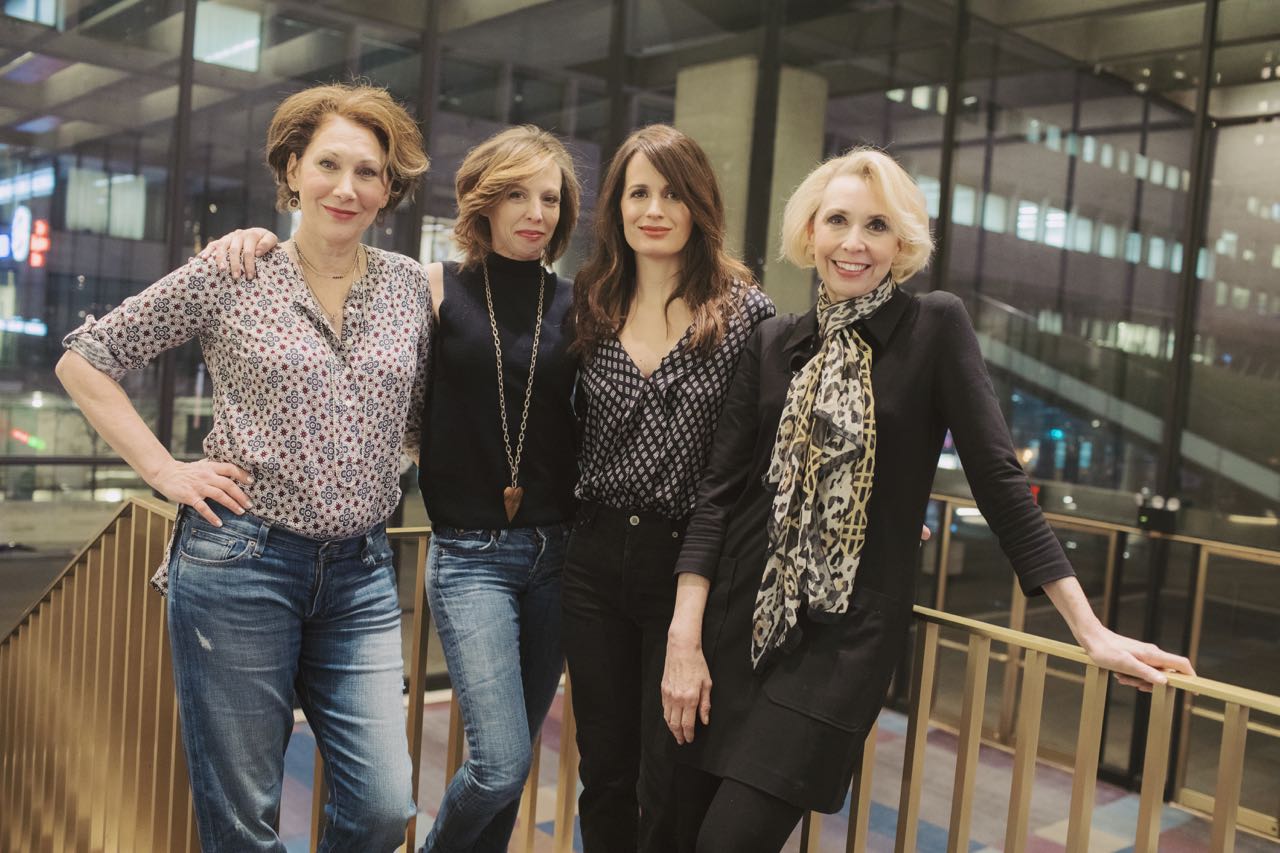
Do any of you have any practical thoughts on things that could make the development of new work better, especially as it pertains to either parts for women or getting more women writers and directors produced?
Elizabeth: God, I wish I knew the answer to that. I think when women start writing, sadly, it’s like no one’s going to give them a shot. I don’t think people really try to make room for that. I think what happens is, girls coming up become these writers, and eventually they just have to be so fucking good that people can’t look away. I would love to think that we’re going to have a community where we start championing more of these women, and I’m sure people do, but I’ve seen it in television and film, and it’s really when women just start doing their own shit. Then people are like, “Wait, that’s good. How do I get some of that?” I don’t know beyond that. Maybe I’m simple, but I think it’s tough.
Maddie: I tell my students, “Write stuff for yourself. Don’t wait to be picked.”
Elizabeth: I wish someone had told me that 20 years ago.
Maddie: Me too. Because I love collaborating. I love working with writers, but I wasn’t encouraged to create my own work as much as I wish I had been. That’s what I would tell actresses specifically.
Elizabeth: Especially now with the Internet, you can do whatever the fuck you want and make stuff.
Maddie: And for young women to form theatre companies. If you’re not a writer, find your village. Because all of us in this dressing room, we would love to work with each other again. That’s another thing. It’s not like one and done.
Julie: No, we’ve got to find a way to make that. Also to encourage women and girls to learn technology. Learn STEM: science, technology, engineering. That will help you. That means you can make your movie. Learn those technical skills. Don’t let anyone tell you otherwise. I don’t know how to, but I’m encouraging others.

